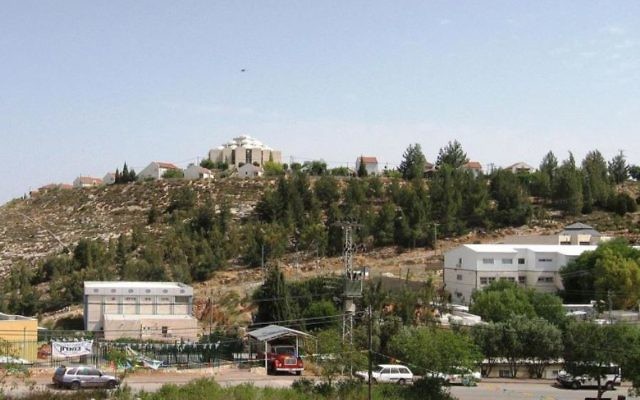Plans for new settlement condemned
For the first time since the Oslo Peace Process, the Israeli government has ordered the building of a new settlement, delighting the right-wing and infuriating the left.
JERUSALEM – For the first time since the Oslo Peace Process, the Israeli government has ordered the building of a new settlement, delighting the right-wing and infuriating the left.
“This is normalisation of our life out here,” the author Yisrael Medad told The AJN on Monday from Shilo, centre of the settlement bloc where the new village will be established. When he moved to the area in 1981 there were only 300 Israelis there; now there are thousands and he is delighted that more will be moving there.
He said happily, “We are filling up this area.”
It’s the kind of reaction that the Prime Minister, who is fighting hard for support from the right-wing public, will have wanted.
Benjamin Netanyahu was forced by a Supreme Court order to evacuate the outpost of Amona last year, as homes were built on privately-owned Palestinian land. Now he’s announced the new settlement, ostensibly to house the 40 families evacuated from Amona. “I promised at the outset that we would build a new community,” Netanyahu said when making his announcement.
He also stressed that plans announced two months ago for 5700 new settler homes in the West Bank are advancing, saying that the construction of 2000 has been put to tender. He added that 220 acres of the West Bank has just been declared “state land,” a key step that paves the way for the use of land for settlement building.
Dovish politicians and activists have asked how a Prime Minister who has declared himself committed to reaching a peace deal with the Palestinians on the two-state solution model can adopt a pre-Oslo approach and approve a new settlement. While there have been some new settlements since the start of the Israeli–Palestinian peace process in the ’90s, none has been ordered by the government – they have rather been established without permission by settlers and then legalised.
“A new settlement in the heart of the West Bank is a strong message to the international community that Israel is not interested in a two-state solution,” Anat Ben-Nun, an official with the Peace Now pressure group, argued in an interview with The AJN.
This is an insult to world powers as they see the two-state solution as the only route to peace, she said.
The biggest admirers and biggest critics of Netanyahu’s latest announcement agree on one thing – that it makes the map of the West Bank less hospitable to a Palestinian state and a two-state solution. Yet for one side this is an achievement while for the other it’s a historic mistake.
Ben-Nun said, “It’s very clear that settlers are trying to cut the West Bank from east to west.”
Establishing a long line of Israeli settlements will make it harder for Palestinians to drive from one major West Bank centre to another, and therefore make the establishment of a “viable” Palestinian state far more difficult, she suggested.
Medad said that his Shilo settlement bloc has always aimed to divide Palestinian population centres and “the planning of that was to make sure the planning of an independent Palestinian state would not be concluded”.
He commented, “If you look at the map you’ll see the Shilo bloc separates Nablus and Ramallah.”
Medad added, “We quite purposely divide these two major population centres.”
The new settlement will add to the strategic importance of the Shilo bloc, he said.
It is unclear whether Netanyahu’s decision to announce a new settlement is a sign of things to come, or a gesture to the Israeli right to soften the blow of what is in the offing. Israel’s security cabinet is understood to have approved a new policy, meant to avoid clashes with Donald Trump’s US administration, to “rein in the footprint” of settlements, by preventing settlers from starting new wildcat communities or “outposts” and by making sure that new settlement construction is limited “wherever possible” to the boundaries of existing settlements.
For the most part the right-wing didn’t raise objections, leading some to surmise that the security cabinet only approved limitations on paper and they will have little or no practical impact. The limitations allow for construction outside of existing settlements when land within the boundaries isn’t available. Peace Now said in a statement that the limitations are meaningless and “while trying to fool the international community, the Israeli government is only fooling itself.”
But the left-wing commentator Barak Ravid wrote in Haaretz that the limitations constitute “Right-mageddon,” and Bezalel Smotrich of the Jewish Home party broke ranks with others on the right, and said that they have adopted “voluntary blindness” towards the impact of the new policy.
Unlike the United Nations and several other international players, the US administration didn’t decry the new settlement, indicating that it was decided before Trump asked the Israelis to restrict settlement activity but that it expects more restraint in future. The Palestinians are pushing for a stronger reaction from Washington.
The chief Palestinian negotiator Saeb Erekat said, “We send a clear message to the US administration, the United Nations and to the European Union: Peace is not going to be achieved by tolerating such crimes.”
NATHAN JEFFAY


comments